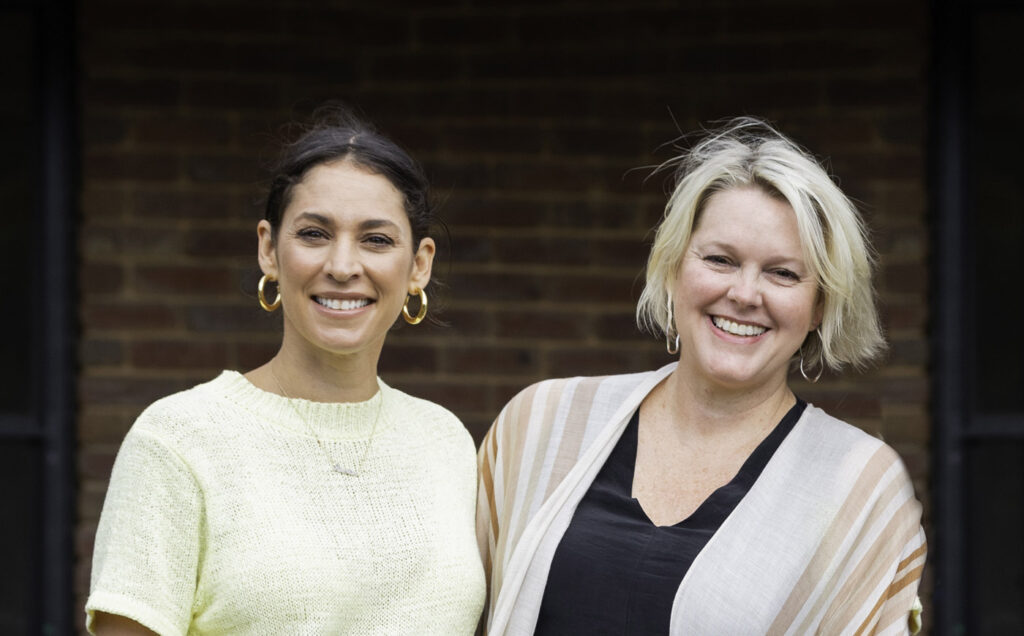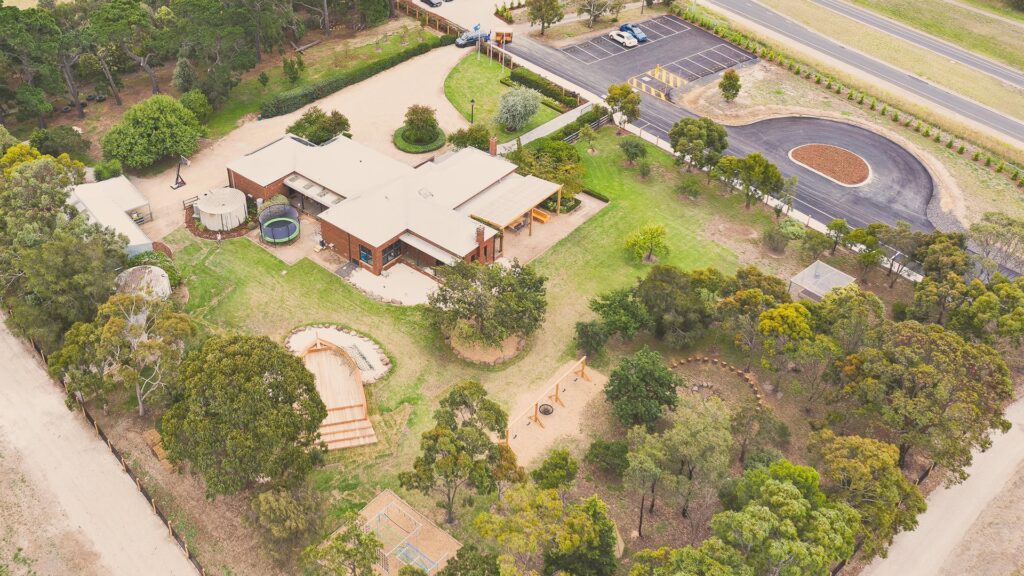Where it began
Woodline Primary was brought to life by Melanie Austin and Lael Stone in 2021.
Melanie’s son had started school years before and was frustrated, upset, and he gradually became a defiant child that didn’t want to go to class. Melanie and her husband started to question why – and it became clear that he needed a supportive, non-punitive, familiar environment that had the same values as his home-life.
On a Friday morning session in 2018, Melanie turned to Lael as her mentor and someone she trusted and asked one simple question, “can you help me start a school?”
Lael’s three children had all experienced challenges in mainstream schooling, mainly around styles of learning, autonomy and choice, and connection with teachers.
Lael’s background in Counselling, Parent Education and Trauma Therapy was to set the foundation and vision for the school whilst Melanie’s background in business and philanthropic endeavours grounded the vision. Together they merged their ideas and values to dream up a school that placed emotional wellbeing at the center of its story.
They both found themselves discussing what could be possible if a school focused on emotional wellbeing first; and learning second. What if there was a school that valued choice and autonomy and understood the environment needed for children to learn?
They spent the first eight months researching education, discussing possibilities, and exploring what it would take to open a school.
The easy part was dreaming what it could look like – and then the challenges came with turning it into a reality. With the support of many skilled people, Woodline began to take shape.
Originally forecast to open in 2020, the opening was delayed due to permits and infrastructure, but trusting in the timing of the school, it all came together to open in January 2021.
As the Founders and Creators of this School, Melanie and Lael both sit on the board and will continue to ensure the vision and essence of Woodline is continued into the future.

Who we are

We are different to mainstream philosophies of learning in that we believe that the key to creating innovative thinkers and emotionally aware little humans who want to learn, is supporting them to feel at home in themselves. Research continues to show that academic success in school is less a marker for future success than evidence of knowing how to work well within the school system.
At Woodline, our aim is to enrich our children’s lives with skills that will support them to recognise what’s important: their understanding and value of themselves. What is important to us is our children’s social and emotional wellbeing: children knowing that all parts of their being are welcomed and supported. The ultimate goal being that children are able to feel this within themselves. They know who they are and that their value in the world is not reliant on grades or approval or colouring in the lines. We recognise that self-knowledge and expression, and interpersonal skills are increasingly valuable in a time of unprecedented technological advancement, and our curriculum and pedagogy are designed to help children develop these skills.
What are those life skills? We call them personal competencies and our mission is to support and empower children to embody these competencies throughout their time at Woodline.
Personal competencies
- Emotional intelligence
- Growth mindset
- Critical thinking
- Self-expression
- Value and acceptance
- Self-actualisation
Supporting Children
It’s cultural. Guides and children together, create an environment in which it feels safe to have a go, to make mistakes, to ask questions, to have a respectful difference of opinion. We rely on the below four pillars of Woodline:
Whole-child approach
In our initial meeting with families, we learn from a child and their family, what makes a child tick: what is important to them, what do they enjoy doing, what is their unique history, and how can we best support them to learn in a way that honours their needs. We then tailor a program that promotes interaction and communication with the class, while also being inclusive and respectful of the individual child. This program is laid out in an Individual Learning Plan (ILP) that is shared with the student and their family, and provides the framework for the child’s year.
We will always be a school with small class sizes. This allows teachers and staff to really get to know each child, and allows time to individuate teaching to suit the strengths and preferred learning style of each child. We are driven by the opportunity to see each child realise their own unique potential, without being obstructed by comparative grades or rankings.
Aware, connected educators
On top of being passionate and talented educators who care deeply about the emotional wellbeing of children, our teachers have all undergone training in Aware Parenting and continue to receive training and support to boost their own wellbeing. As parents, we know that our own wellbeing is vital in ensuring we have the energy, presence and patience to give our best selves to our children, and of course we want this for our teachers too. We run a program of listening partnerships and personal development that nourishes teachers so that they are able to give their best to their students.
Progressive model of non-punitive discipline
Neurobiological research is very clear that it is only when we feel in a state of emotional safety that an individual is able to take on new information. We don’t use the fear of failure or threats of punishment to motivate or frighten children into compliance. What we’re looking to build in our students is intrinsic motivation – compliance is merely a result of an extrinsic motivator.
If a child is having a difficult time, we create a safe space for them to offload what they are feeling and find a democratic resolution. Educators ask, “How can we both get our needs met?” and we genuinely look to the child for ideas.
Children are seen and heard
We value inquiry, negotiation and curiosity and design our curriculum to explore areas in which children are interested, and students are encouraged to collaborate with teachers and each other in creating topics and activities throughout the year.
Depth over breadth curriculum
Although we work within the framework of the Australian Curriculum, our model focuses more on depth over breadth, in order to work toward mastery. This focus on a deep exploration of a subject allows time for individual students to reach a point of understanding and confidence, as well as developing their growth mindset.
Values-based
The values of Woodline are driven by the personal values of our founders and their vision for the school.
- Connection
- Environmental
- Responsibility
- Openness
- A sense of wonder and curiosity
- Emotional safety
- Honouring the individual
Not only are children held by staff and the school environment that embodies these values, our curriculum implicitly and explicitly teaches the values so that they form part of our students’ internal compass.
Multi-influenced, evidence-based pedagogy
Pedagogy is the method of teaching – the art, science and practice that breathes life into the curriculum. Our pedagogy embraces the need for different learning styles and is reflective of our values:
- Connection and emotional safety are key tenets of trauma-based education and the PERMA based, Positive Education framework.
- The Reggio Emilia framework is noted for its focus on connection, as well as for honouring the individual.
- A sense of openness and an honouring of the individual is prominent in UNESCO’s Global Citizenship curriculum framework and Michael Fullan’s 6 Cs curriculum.
- Environmental responsibility is a core tenet of the OECD’s recent work on global competency
- Play-based learning forms the basis of the Early Years Learning Framework. It fits with Woodline’s core value of having and creating a sense of wonder and curiosity.
Alternative measures of success
A key measure of success is in the development of a child’s understanding of themselves and the value they place on their unique gift. Each child brings with them their own unique brilliance, so to assess them all against one benchmark or to measure them against each other is to fail to recognise their individuality, and to risk homogenising students, squashing their confidence or communicating that they are valuable only because of their grade.
We value academic achievement at the effort level rather than focusing on the grade. This ensures that academic achievements are not pursued at the expense of a child’s emotional health and wellbeing. It is not our intention to produce students who have mastered school for its own sake, but students who are self-realised and equipped with valuable life skills. To this end each child’s Individual Learning Plan (ILP) takes into account their own starting point and assessment measures their progress from this starting point. From understanding fractions to being able to communicate their needs effectively, what is valued is the effort they have put into learning. The outcome is secondary.
Children at Woodline learn within the spectacular backdrop of a 20 acre farm within Geelong’s hinterland, where they can explore the natural environment, sparked by wonder and curiosity. Our playgrounds are made from natural materials and offer endless inspiration for open-ended play. The playground area is designed for children of all ages to play together: the younger children learning from the older ones how to take risks and explore, while giving older children opportunities to help, teach and learn from those in other year levels.
Each class takes responsibility for its own aspects of the farm, whether that be feeding the horses or chickens, topping up the worm farm, weeding, watering, or designing and helping to build bird-repellent enclosures for the veggies. We encourage children to be outside as much as they need and like, and we hold classes outside whenever we can.
We shall also be offering extracurricular activities with pony/horse care as well as riding for children that are interested.
An important and differentiating part of Woodline is our commitment to supporting and providing ongoing education for families. We offer regular workshops on topics as diverse as parenting, microfarming, and body awareness, sex and consent. As well as presentations discussing the latest research on how education is impacted by elements such as neurobiology, environment, society and technology. These sessions are provided by members of our own school community or the local community that have expertise or credentials and experience in a particular field.
Of course we are conscious that extra-curricular activities don’t always fit with our schedules, so we also offer audio or video recordings on our parent portal, for families to watch at a time that is convenient, although a core benefit of coming along to the sessions is the opportunity to meet other parents and community members. We are parents ourselves and we know the importance of a community that shares our values, with whom we can share and be ourselves.
